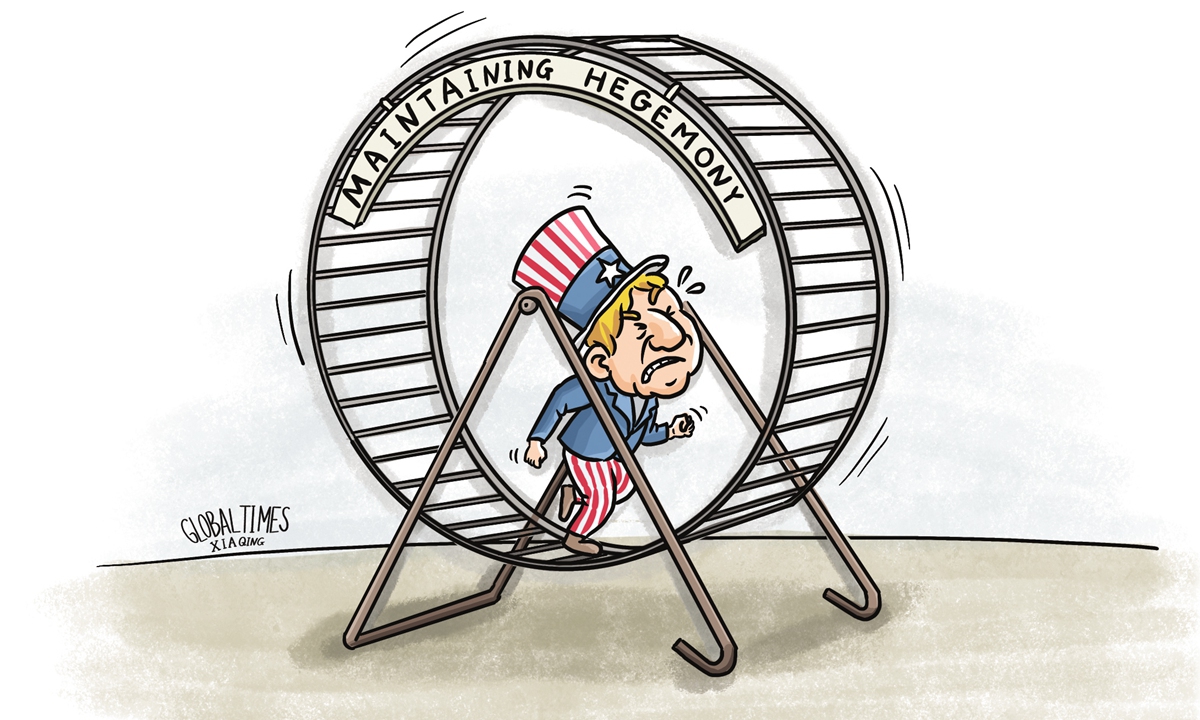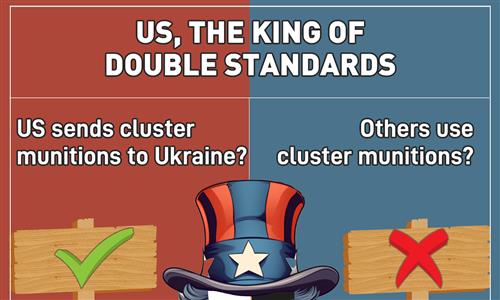
Illustration:Xia Qing/GT
What exactly is the rules-based order, the most frequently used term in US diplomacy? It has never been precisely defined, until a recent trending tweet unveiled its true mafia-style nature.Nury Vittachi, a Sri Lankan-born and Hong Kong-based veteran journalist, put down 10 definitions on rules-based order on Monday, including: The US rules the world; the US makes all rules; no one can know what the rules are, only that they exist; the US will be in charge of the flexibility provided by the rules' non-existent nature; alternative rules of governance which work successfully (cf. China, Singapore) must always be derided as "authoritarianism;" unfair global dominance by the 13 percent Western minority (cf. totalitarianism) must always be referred to as "democracy."
At least two points can be dug up in the definitions. Firstly, no one knows what the rules-based order is and how it is formulated apart from the US. Washington has been deliberately avoiding offering a detailed explanation, as vague rules offer more flexibility for the US to interpret them as they see fit. Secondly, the excessive self-centered hegemonic practices of the US have long caused dissatisfaction among many countries and individuals worldwide. This widespread discontent has been ignited by this tweet, which gained popularity and supportive comments.
If one examines major decisions that the US has made in recent years, they will find Vittachi's definitions are a perfect match. A latest example is the case of cluster bombs. In February 2022, then White House press secretary Jen Psaki called the use of cluster bombs a "war crime." A year later, the US altered its "rules" and decided to send these cluster bombs to Ukraine.
The rules-based order suppresses anything that challenges US hegemony, such as China's rise. Consequently, the US believes it is "righteous" to impose unilateral sanctions or export controls on China. But when China introduced its own set of export control rules on gallium and germanium, Karin Jean-Pierre, a White House spokeswoman, accused China of exerting pressure through the economy, underlying it is not fair play.
Also, in the context of containing China, the US has a rule - Taiwan island must not be reunified by the Chinese mainland. It does not care whether the Taiwan question bears on China's own sovereignty and territorial integrity, if China does not accept the US' rules, it would mean a violation of the rules-based order, Shen Yi, a professor at Fudan University, told the Global Times.
For the US, the rules-based order must also serve its own interests. For example, when free trade benefited the US, Washington vehemently opposed any involvement of the government in the markets of other countries. But when free trade no longer yields significant benefits for the US, Washington makes no hesitation in implementing measures such as Inflation Reduction Act, which the EU finds has put EU-based producers at a disadvantage, as they are compelled to compete in a distorted market with subsidized US-based producers.
This is not a rules-based order, but a dictatorial order, a mafia international order. It only proves that when the US brags about how democratic it is at home, it is pursuing authoritarianism abroad.
To be honest, this is even worse than a mafia order, as a mafia boss may to some extent follow certain moral gangster rules. But the US no longer has moral principles, Shen said. All it has is selfishness.
More importantly, the US is running out of strength to maintain this selfish order. US hegemony is riddled with holes, like a leaking ship. Thanks to either wars directly waged by the US or proxy wars fanned by it, the superpower has caused severe civilian casualties and property damage worldwide, leading to huge humanitarian disasters one after another, which, in turn, jeopardized US comprehensive national strength and international reputation. Not to mention signs over crumbling US dollar hegemony are bubbling.
The international community is awakening to what the rules-based order really is. More emerging countries are seeking a multipolar world. This has surely upset the US. Washington is making more effort in peddling its values and ideologies to bind its Western allies to its side. However, as former Singaporean diplomat Kishore Mahbubani put it, even Washington's staunch allies "might be secretly planning for alternative scenarios" for US decline.
The louder the US is over the rules-based order, the more it proves the US is incapable of maintaining it. Otherwise, there is no need to talk about it all day long in such a high-profile manner. What the US needs the most now is other countries' recognition of this order. However, all the deeds the US has made, with double standards or multiple standards, to serve US short-term interests, will only erode other countries' acceptance of US' rules.
The expression of the rules-based order itself is neutral, and can even be understood as an idealized order. However, the power to define it should belong to the mainstream international society, not the US alone.

